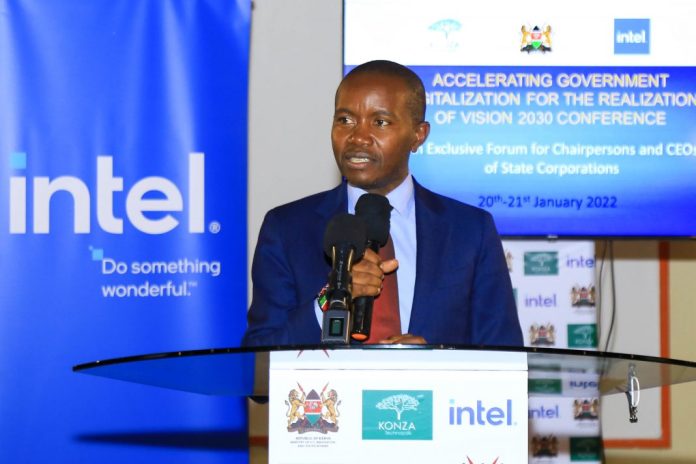Joe Mucheru, the outgoing Cabinet Secretary for ICT, Innovation, and Youth Affairs, is at the center of a power struggle for the position of CEO of the ICT Authority, a state corporation.
The corporation’s problems began last month, when Mr Mucheru appointed Mr Stanley Kamanguya as CEO near the end of former President Uhuru Kenyatta’s tenure on August 8, just a day before the general election.
According to documents filed with the Labour Relations Court in Nairobi, Mr Kamanguya was ranked second after the May interviews, with 73.4 points, trailing Dr Paul Kiprono Ronoh, who was ranked first with 82.7 points. Mr. Fredrick Okoth Bitta came in third place with 71.4 points.
On September 15, the corporation’s board of directors informed the staff of Mr Kamanguya’s appointment. The court had issued orders on August 23 against the appointment of a substantive CEO at the time of the communication.
The orders were issued to Mr Mucheru in response to a suit filed by the rights lobby group Uzalendo Institute of Leadership and Democracy, which questioned Mr Mucheru’s power to fill such high-level government positions.
Mr Kamanguya was appointed to replace Dr Ronoh, who had served as acting CEO since September 2021, following Catherine Getao’s retirement.
Mr Mucheru stated in a Gazette notice dated August 8 that Mr Kamanguya would serve as CEO for three years. However, according to the court order issued by Judge James Rika, Dr. Ronoh must continue to act until the dispute is resolved.
Mr Mucheru is being sued for misbehaving by making a major public appointment during the transition period.
Kinyua, the Head of Public Service, had also issued a directive to all Cabinet and principal secretaries prohibiting CSs from being appointed to boards of state corporations or agencies, redeployed, or promoted within ministries and state departments.
The hiring of Mr. Kamanguiya, according to the lobby, is illegal and unconstitutional because it occurred during a transition period.
“If the President does not have the power to make appointments of public officers during temporary incumbency, then Mr Mucheru, being a Cabinet Secretary, does not have the power to make appointments of public officers as well during such a period.”
It contends that a Cabinet Secretary’s tenure is linked to that of the President. As a result, during a president’s temporary incumbency, a CS cannot nominate or appoint public officers.
As respondents, the group has named the CS, the chairman of the ICT Authority, who is represented in the suit by lawyer Kibiru Njenga, and the Attorney General.
On May 5 and 13, the authority advertised for a CEO. Mr Kamanguya was appointed competitively and procedurally to represent Mr Mucheru before the court issued the orders.
“The court has no mandate to interfere with the lawful exercise of authority by the Cabinet Secretary. The court would be acting excess of its powers by reversing an appointment undertaken by another competent public body in conformity with the law in place,” he says.
However, the lobby claims that Mr Mucheru made the appointment during a transition period after finalizing the recruitment for more than two months. It wants the court to rule that a CS’s tenure is linked to the President’s, and thus a CS cannot nominate or appoint public officers during a president’s temporary incumbency period.
It is also requesting that any appointments or nominations of public officers made by CS Mucheru during his temporary incumbency under Article 134 of the Constitution be declared invalid.
It also seeks an order voiding the Gazette notice, the effect of which was to make appointments during the temporary incumbency.
The dispute arises at a time when the world has increased ICT investment in all sectors in order to boost economic growth and improve service delivery.
Dr. Ronoh began his tenure at the authority as the director of programs and standards.



















